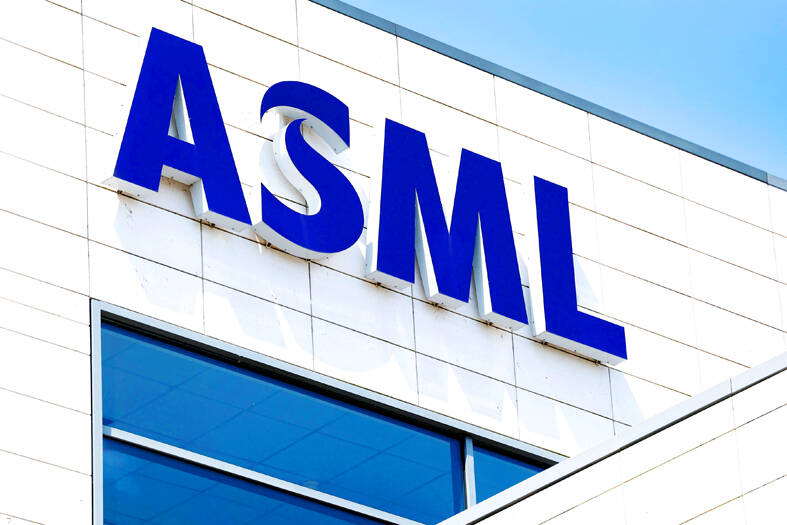Netherlands-based ASML Holding NV, a leading global supplier of semiconductor production equipment, has received the green light to invest more than NT$10 billion (US$314 million) in Taiwan to set up a plant in New Taipei City’s Linkou District (林口).
The Investment Commission has approved an application by ASML to infuse about NT$5.65 billion and 140 million euros (US$152 million), which is in excess of NT$10 billion in total, into ASML Taiwan Ltd (台灣艾司摩爾), a subsidiary that specializes in wafer measuring equipment and provides its clients with technological support and training, it said in a statement.
Commission spokesperson Su Chi-yen (蘇琪彥), said the Dutch-based company filed an application with the authorities for approval of the investment plan it announced late last year to build a plant in Linkou.

Photo: Reuters
In November last year, when the investment plan was announced, ASML said it would invest globally and in Taiwan to prepare for the company’s continued growth, while supporting global customers and the development of the semiconductor industry.
ASML is the world’s sole supplier of extreme ultraviolet (EUV) lithography photolithography machines used by semiconductor manufacturers to produce chips.
Currently, ASML has 60 operations hubs in 16 countries worldwide, with Taiwan being its largest hub in Asia. In Taiwan, ASML has four client support centers, two R&D centers and two training centers, and is believed to provide EUV machines to the world’s largest contract chipmaker Taiwan Semiconductor Manufacturing Co (台積電).
In addition to ASML, the commission said it approved a plan submitted by Netherlands-based Yahoo Holdings BV to inject about NT$3.6 billion into Yahoo! Digital Marketing Ltd (雅虎數位行銷), which provides electronic information services and advertising services in Taiwan.
Meanwhile, CTBC Bank Co (中信銀行) was approved to remit US$37.05 million to CTBC Bank (Philippines) Corp as a loan to conduct banking business in the Southeast Asian country, and Hon Hai Precision Industry Co (鴻海精密) secured approval to invest US$329 million in Foxconn Singapore Pte Ltd for the company’s investments in India and Vietnam, the commission said.

Sweeping policy changes under US Secretary of Health and Human Services Robert F. Kennedy Jr are having a chilling effect on vaccine makers as anti-vaccine rhetoric has turned into concrete changes in inoculation schedules and recommendations, investors and executives said. The administration of US President Donald Trump has in the past year upended vaccine recommendations, with the country last month ending its longstanding guidance that all children receive inoculations against flu, hepatitis A and other diseases. The unprecedented changes have led to diminished vaccine usage, hurt the investment case for some biotechs, and created a drag that would likely dent revenues and

Global semiconductor stocks advanced yesterday, as comments by Nvidia Corp chief executive officer Jensen Huang (黃仁勳) at Davos, Switzerland, helped reinforce investor enthusiasm for artificial intelligence (AI). Samsung Electronics Co gained as much as 5 percent to an all-time high, helping drive South Korea’s benchmark KOSPI above 5,000 for the first time. That came after the Philadelphia Semiconductor Index rose more than 3 percent to a fresh record on Wednesday, with a boost from Nvidia. The gains came amid broad risk-on trade after US President Donald Trump withdrew his threat of tariffs on some European nations over backing for Greenland. Huang further

Macronix International Co (旺宏), the world’s biggest NOR flash memory supplier, yesterday said it would spend NT$22 billion (US$699.1 million) on capacity expansion this year to increase its production of mid-to-low-density memory chips as the world’s major memorychip suppliers are phasing out the market. The company said its planned capital expenditures are about 11 times higher than the NT$1.8 billion it spent on new facilities and equipment last year. A majority of this year’s outlay would be allocated to step up capacity of multi-level cell (MLC) NAND flash memory chips, which are used in embedded multimedia cards (eMMC), a managed

CULPRITS: Factors that affected the slip included falling global crude oil prices, wait-and-see consumer attitudes due to US tariffs and a different Lunar New Year holiday schedule Taiwan’s retail sales ended a nine-year growth streak last year, slipping 0.2 percent from a year earlier as uncertainty over US tariff policies affected demand for durable goods, data released on Friday by the Ministry of Economic Affairs showed. Last year’s retail sales totaled NT$4.84 trillion (US$153.27 billion), down about NT$9.5 billion, or 0.2 percent, from 2024. Despite the decline, the figure was still the second-highest annual sales total on record. Ministry statistics department deputy head Chen Yu-fang (陳玉芳) said sales of cars, motorcycles and related products, which accounted for 17.4 percent of total retail rales last year, fell NT$68.1 billion, or